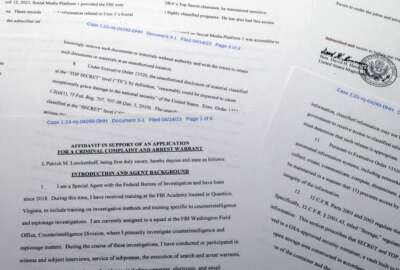Hubbard Radio Washington DC, LLC. All rights reserved. This website is not intended for users located within the European Economic Area.
McDonald says ‘biggest reorganization of VA’ to rebuild trust is underway
VA Secretary Bob McDonald said the new "Road to Veterans Day Action Review" released Thursday will help change the culture of the agency. The three-pronged stra...
wfedstaff | April 17, 2015 9:27 pm
Veterans Affairs Department Secretary Bob McDonald’s goal is straightforward: rebuild the trust in the agency. In his first 100 days as secretary, McDonald met with dozens of employees, lawmakers and other key stakeholders to both listen and understand how best to do that.
Thursday, he released his plan on how to fix what many have called systemic management, accountability and process issues at VA. 
- Rebuilding trust;
- Improving service delivery;
- Setting the course for long-term excellence and reform.
McDonald said VA’s mission is clear — everything must be done through the lens of the veteran.
“We balance caring for veterans and making sure we are good stewards of shareholder money and trust,” McDonald said Thursday during a press roundtable in Washington sponsored by the Christian Science Monitor. “Our values, I think, are the right values. Many of us have started wearing these pins with the acronym ICARE. It’s an acronym that not only connotes how we care about our veterans, but is also an acronym that represents the different values of the organization. ‘I’ stands for integrity. ‘C’ is for commitment. ‘A’ is for advocacy for our veterans. ‘R’ is for respect for our veterans and for each other. And ‘E’ is for excellence, the kind of program, the kind of health care, the kind of benefits that we want to provide.”
McDonald said his listening tour in preparing for the 90-day review started with asking each of VA’s senior executives, managers and employees to rededicate themselves to the value and mission of the agency.
Applying Lean Six Sigma
In the last 100 days since he was confirmed as secretary, McDonald visited 41 VA facilities in 21 cities, met with every Veteran Service Organization (VSO) and with 67 senators all designed to gather information about how to change VA.
One way VA is trying to improve its processes and change its culture is by applying the concepts of Lean Six Sigma.
McDonald said the use of this process improvement approach isn’t common in the health care industry.
“We are going through a process right now of benchmarking the private sector on what acceptable wait times are. What you’ll find is it varies widely depending upon whether it’s primary care or whether it’s a specialty, and it also varies by geography,” he said. “We’re trying to figure out what the right standards are. We’ve used the 30 days from the date the veteran would like the appointment as the standard we are using right now. Until we get a more defined standard and one that works well with the private sector, we’ll use that standard.”
VA reported it has reduced the wait time for patients seeking primary care by 18 percent, scheduled more than 1.2 million more appointments over the last four months as compared to the same period last year and authorized more than 1.1 million non-VA care authorizations, a 47 percent increase over the same period last year.
VA also is applying Lean Six Sigma to their congressional and general correspondence process. The agency has come under scrutiny for not responding to letters from lawmakers over the last few years in what members of Congress say is in timely fashion.
I can’t just walk in and fire somebody
McDonald also tried to clarify his intent and actions so far in disciplining the executives allegedly responsible for falsifying patient wait times, committing procurement fraud and other problems.
McDonald said he recognizes why there is impatience among members of Congress and others. He said one way to change the agency’s culture is to change how people are held accountable and that‘s what he is doing.
But he said the Veterans Access, Choice and Accountability Act doesn’t give him the broad powers many think it does.
“The important thing that I have to look at, and believe me I’ve been involved in disciplinary actions all over the world, is we have to make sure whatever action we take sticks, it’s fair and on appeal, we are successful,” he said. “Let’s look at the new power I was granted. The new power I was granted is the appeal time for a Senior Executive Service employee of the VA has been reduced in half. That is the only change in the law. What does that mean? Well, SESers are less than 1 percent of all VA employees, and the only change is the appeal time. So the law didn’t grant any kind of new power that suddenly would give me the ability to walk into a room and fire simply fire people. I wouldn’t do that anyway. Our Constitution provides for due process, and we are following the due process.”
McDonald said there are more than 100 people under investigation by the FBI, the Justice and the agency inspector general, including 40 SESers. VA terminates or separates more than 3,000 people a year.
McDonald also addressed the criticism of letting those under investigation retire with the full benefits, such as former VHA deputy chief procurement officer Susan Taylor.
“The law says that you cannot claw back the retirement earned over a career unless the person commits treason or a treasonous-like activity. That is a criminal violation,” he said. “So I have to wait for the FBI and the Department of Justice to determine if the criminal violation has been committed in which case they would prosecute before I can take disciplinary action. I do not have the authority to claw back the retirement. And I have to tell you in the private sector, a CEO doesn’t have the authority to claw back retirement. That would be violating the constitutional property rights. These laws are very clear and I’m skeptical that members of Congress do not understand the law. What disturbs me is we are trying to create controversy using veterans to do that, and I don’t think that’s appropriate.”
McDonald reiterated he is moving as fast as possible under the law, and has brought on new senior staff to offer fresh eyes on the cases and problems.
Another challenge for VA is how they are protecting and listening to whistleblowers and others with concerns about the agency. McDonald said he’s met with whistleblowers and union representatives during his first 100 days.
McDonald said VA is taking four steps to ensure whistleblowers are listened to and protected.
“If we have any inkling that we are going to take disciplinary action against somebody, we move them out and they are no longer in the operations,” he said. “Secondly, when I go to sites, I meet with whistleblowers and ask them about retaliation. Number three, we’ve been certified now by the Office of Special Counsel in their whistleblower certification program. That was not the case previously. Number four is when we’ve remediated these situations like we did in Phoenix, the three individuals there got great jobs. If you talk to them today, I think they will tell you things have changed and they are happy with their new jobs. At least that’s what they told me, so you should check with them.”
McDonald said he’s made it clear in video, in writing and during personal visits that retaliation against whistleblowers will not be tolerated. He said he wants to know about any retaliation and will go to the source to find out more.
Overall, McDonald said he knows change is slow, but he believes things are getting better.
For example, when he first took over as secretary in July at his first press conference, he gave out his cell phone number and started receiving 250 calls or texts a day. He said he set up a team to help him handle those calls and texts, and 30 percent have been answered, though some were repeat calls or people asking for things out of his control, such as for full disability rating instead of a partial one.
McDonald said now he receives about 5-to-10 a day, so while that is but one measure of change, he said it shows the battleship is starting to turn in the right direction.
RELATED STORIES:
House lawmakers lose patience with VA, introduce prescriptive cyber bill
New VA secretary promises flatter, more open organization
VA exec at center of FedBid procurement scandal retires
VA settles complaints by 3 Phoenix whistleblowers
Copyright © 2024 Federal News Network. All rights reserved. This website is not intended for users located within the European Economic Area.
Jason Miller
Jason Miller is executive editor of Federal News Network and directs news coverage on the people, policy and programs of the federal government.
Follow @jmillerWFED





